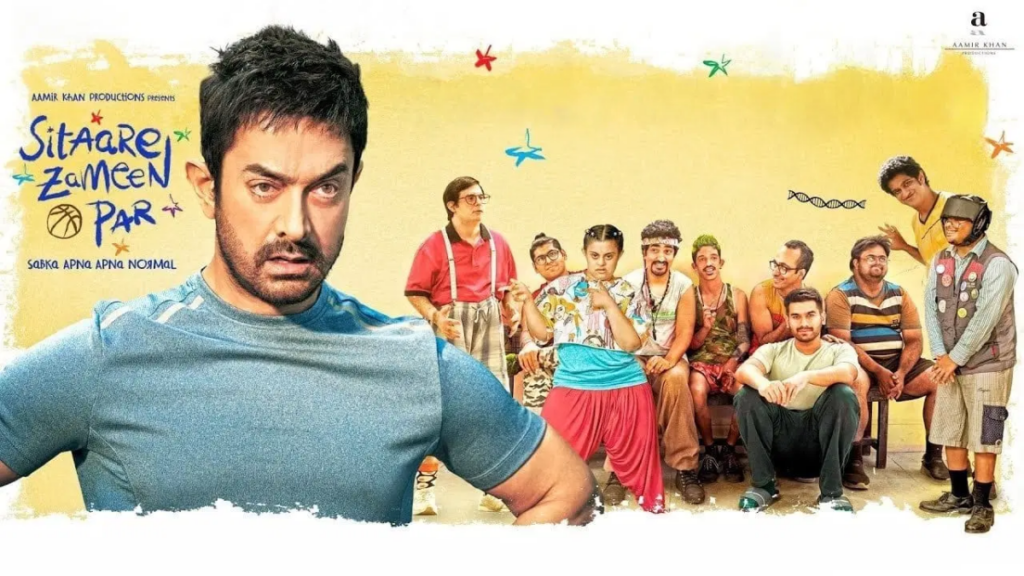The Aamir Khan starrer Sitaare Zameen Par, an official remake of the Spanish film Champions, could be seen as a spiritual sequel to his directorial debut, Taare Zameen Par (2007). Directed by RS Prasanna, the film tells us that people with different abilities deserve equal respect, love, and space in our society. And while the intent is noble, the film often feels too eager to teach us its message rather than conveying it simply through its story.
Gulshan (Aamir Khan) is a hot-headed, middle-aged basketball coach who is prone to losing his temper, especially whenever anyone mentions his short height. His inflated ego leads to an on-court scuffle during a basketball match that turns physical, earning him a suspension. Matters get worse when a drunken accident lands him in court. As punishment, he is assigned community service, training a team of differently abled individuals for a basketball tournament. At home, things aren’t any better. He’s estranged from his wife Sunita (Genelia Deshmukh nee D’Souza) and now lives with his spirited mother Preeto (Dolly Ahluwalia), enduring her sarcastic banter and sharp observations. But as Gulshan begins to spend time with his new team, he is forced to confront the uncomfortable truths about his failures, pride, and what it truly means to win in life…
Sitaare Zameen Par believes in celebrating the small joys of life. The screenplay by Divy Nidhi Sharma is simple and straightforward, not bowing down to typical star vehicle tropes. The film makes us smile at several places and empathize with the differently abled boys, who, despite their challenges in mind or body, are doing their best with what they have. Like Gulshan, we too are reminded that sometimes we need to pause and reflect on our judgments and privileges. Even the humor in the film comes as a pleasant surprise. It proves that you don’t need vulgar jokes or double-meaning dialogues to make people laugh, something that’s become a vice in many recent Hindi films.
The film also reminds us that you can tell a meaningful story with heart, without shouting or forcing melodrama. Some of the best moments are quiet and thoughtful, like a simple, emotional conversation between two adults about the backstory of a specially abled child. Gulshan’s transformation, too, is shown with subtlety, not loud declarations. The film avoids dramatic background music or over-the-top scenes to show his change. Instead, we see him quietly helping someone tie a shoelace or gently removing capsicum and onion from a pizza – small acts but which say a lot in the context of the story.
But this simplicity, while capturing some of the smaller moments of the film beautifully, lets it down in other aspects. There is a flatness to the narrative, lacking the ups and downs or clearly defined plot points to engage us consistently through the film. The sports match lacks the energy that keeps viewers on the edge of their seats. Gulshan’s troubled relationship with Sunita doesn’t resonate with any real emotional weight while his journey with his players, touring various cities, does little to energise the narrative or deepen our connection to the characters. Moreover, the focus stays far too much on Gulshan and his transformation. Thus, it takes away from the more important voices that deserve attention.
Another problem is that the film tends to repeat its message far too much, almost as if the audience won’t get it otherwise. And many key changes in Gulshan’s character are told to us through dialogue, instead of being shown through strong emotional scenes. His final realization, too, feels a little too direct and on the nose. The two women in Gulshan’s life – his wife and his mother – are not given enough space either. Their characters could have been much more involved and meaningful.
Performance-wise, Aamir Khan carries the film with a convincing and focused enough performance, though some parts of his act come across as performed rather than lived. Aroush Datta, Gopi Krishnan Varma, Vedant Sharmaa, Naman Misra, Rishi Shahani, Rishabh Jain, Ashish Pendse, Samvit Desai, and Simran Mangeshkar – all playing the team of players with intellectual disabilities—win our hearts with their performances and dialogue delivery. They are charming and often genuinely funny despite the script tending to reduce them to one-note characters. The supporting cast, including Genelia Deshmukh, Dolly Ahluwalia, and Gurpal Singh, shine in their limited screen time and make the most of the moments where they are given space to perform.
The cinematography by G Srinivas Reddy is simple and gimmick-free, focusing more on serving the story and capturing the characters’ emotions. The editing by Charu Shree Roy is smooth and well-paced, but it isn’t enough to rescue the film when the message begins to overpower the storytelling. The sound design supports the film effectively without standing out too much. The music by Shankar-Ehsaan-Loy is pleasant enough, though not particularly memorable. However, the end credit song, Shubh Mangalam is a welcome surprise, truly touching us. The background score by Ram Sampath is effective and enhances the emotional beats, though it stays mostly within familiar territory.
Sitaare Zameen Par means well and has its moments. However, it misses the chance to dig deeper, and is not as daring, complex, or honest as the lives it claims to represent.
Hindi, Drama, Comedy, Color



The scene where the lady judge sentences Aamir’s character to three months of service with mentally challenged children instantly reminded me of Rajesh Khanna’s classic ‘Dushman’ From there, the trajectory felt familiar — echoes of Disco Dancer, Boxer, Jo Jeeta Wohi Sikandar, and more.
But all said and done, the film’s strengths still outweighs its flaws.
A low-budget movie that resisted the OTT temptations and leans heavily into emotions, moments, and laughter — are all solid ingredients for a crowd-pleaser. If exploited well, it can easily match the box office success of many flashy, over-the-top masala films – the Industry thinks is the mantra to success at the BO.